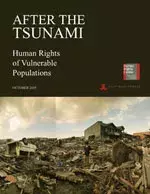Error message

This report is out of print but is available here as a free PDF file.
After the Tsunami: Human Rights of Vulnerable Populations is based on interviews conducted by research teams in March and April 2005 with hundreds of tsunami survivors, government officials, human rights activists, and aid workers in five tsunami-affected countries -- India, Indonesia, Sri Lanka, the Maldives, and Thailand.
Survivors continue to suffer from inequities in aid distribution and substandard shelter throughout countries affected by the December 2004 tsunami. After the Tsunami also documents numerous violations of human rights in the wake of the tsunami, including arbitrary arrests, recruitment of children into fighting forces, discrimination in aid distribution, enforced relocation, and sexual and gender-based violence. Tsunami survivors reported widespread inequities in aid distribution on the part of some government agencies as a result of favoritism and political influence, bureaucratic inefficiencies, and caste affiliation. Government authorities rarely, if ever, investigated such abuses. Finally, government agencies and aid organizations often failed to consult people in affected communities about aid distribution and reconstruction.
The study recommends that governments in tsunami-affected countries should commission an independent study to investigate reports of inequities in aid distribution; increase accountability and transparency of public and private aid providers; and develop mechanisms that will enable tsunami survivors to participate in reconstruction planning and implementation.
Also related to the Indian Ocean tsunami: Hope for Renewal: Photographs from Indonesia after the Tsunami, a catalogue of images by Marco Garcia, featured in an East-West Center exhibition.
This report is out of print but is available here as a free PDF file.
After the Tsunami: Human Rights of Vulnerable Populations is based on interviews conducted by research teams in March and April 2005 with hundreds of tsunami survivors, government officials, human rights activists, and aid workers in five tsunami-affected countries -- India, Indonesia, Sri Lanka, the Maldives, and Thailand.
Survivors continue to suffer from inequities in aid distribution and substandard shelter throughout countries affected by the December 2004 tsunami. After the Tsunami also documents numerous violations of human rights in the wake of the tsunami, including arbitrary arrests, recruitment of children into fighting forces, discrimination in aid distribution, enforced relocation, and sexual and gender-based violence. Tsunami survivors reported widespread inequities in aid distribution on the part of some government agencies as a result of favoritism and political influence, bureaucratic inefficiencies, and caste affiliation. Government authorities rarely, if ever, investigated such abuses. Finally, government agencies and aid organizations often failed to consult people in affected communities about aid distribution and reconstruction.
The study recommends that governments in tsunami-affected countries should commission an independent study to investigate reports of inequities in aid distribution; increase accountability and transparency of public and private aid providers; and develop mechanisms that will enable tsunami survivors to participate in reconstruction planning and implementation.
Also related to the Indian Ocean tsunami: Hope for Renewal: Photographs from Indonesia after the Tsunami, a catalogue of images by Marco Garcia, featured in an East-West Center exhibition.




